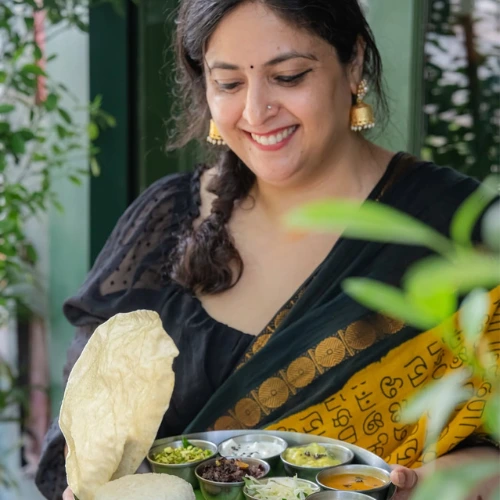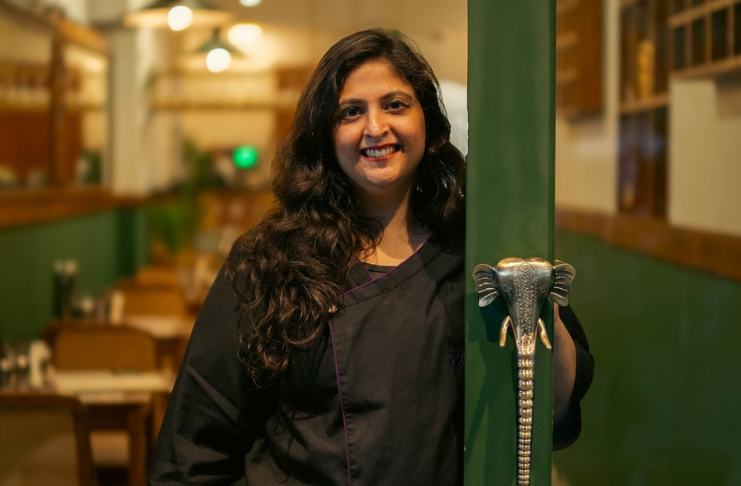At just nine years old, Ruchira Hoon discovered the kitchen as a space of possibility and creativity. With a natural curiosity and a hunger for flavor, she began experimenting. Her mother, though not particularly passionate about cooking, had unknowingly opened the door for Ruchira to fall in love with it.
And then came the sandwich that changed everything.
The recipe for a simple club sandwich was on the back of a potato chip packet. For most children, it would have been a passing curiosity. For our 12-year-old, it became a two-day mission.
“I remember I spent two days trying to prep for that,” Ruchira recalls. “My mum said we could get some ham. I got some very good quality bread.”
With ingredients secured, young Ruchira guarded her precious packet with territorial fervor so no one would eat them before her masterpiece was complete.
The sandwich wasn’t just delicious; it became a rage among her friends. “Anybody who came home would want to eat this spicy club sandwich,” she said.
And so, Ruchira had her first signature dish ready at 12. But life had other plans.
In conversation with The Restaurant Times, Ruchira recounts the story of a woman who found her calling at nine, passed it for decades, stormed the gates at 35, and is now going stronger than ever.
The Journalist Who Never Stopped Cooking
Very early (in her 6th grade, to be precise), Ruchira announced that she wanted to be a chef. But her father insisted she complete her education first.
Obediently, she got her bachelor’s and master’s degrees, and the next thing she knew, she was a journalist.
Her journalism may have paid the bills, but cooking fed her soul. She didn’t just write about food; she lived, breathed, and studied it with scholarly devotion. Take one of her articles comparing five types of butter chicken recipes, for example. The project was characteristic of her all-in approach: “I would cook for the team. Sometimes, two butter chickens a day. The team ate it and graded it. I did everything in real time before adding it to the article.”
While others spent weekends socializing or resting, Ruchira “cooked through books,” turning her home kitchen into a culinary laboratory. “I would call people for dinner. I couldn’t stop cooking. It had consumed me.”
Through her thirties, this dual life continued, journalist by profession, chef by passion, until finally, at 35, the dissonance became too great to bear. And that’s when she switched.
Cookbooks as Sacred Texts
Where most chefs often name-drop the restaurants or culinary icons they’ve trained under, Ruchira proudly declares an unconventional influence.
“I think my addiction to cookbooks has been a very defining point in my career,” she says. “If I have a mentor or a guru, it’s my cookbooks. I have a lot of reverence for cookbook authors because they shaped how I could cook.”
This self-taught approach has given her a distinctive voice in a crowded field. When she eats at restaurants, she’s not simply enjoying the meal but studying it. “I am the kind who will read a menu, even the finest of fine print,” she says. If she finds a molecular gastronomy element that intrigues her, she won’t rest until she’s mastered it, adapted it, and recontextualized it.
The Weight of Being a Woman in the Kitchen

The culinary world remains notoriously harsh for women, and Ruchira hasn’t been spared its uglier side.
“People make nasty comments,” she says. “I had a fellow chef who is now with a leading hotel [who] commented, ‘Oh, she’s so fat. How can she even stand in the kitchen?”
Then familiar stereotypes followed: women can’t lift heavy pots, can’t handle the pressure, don’t belong in professional kitchens. But rather than internalizing these barbs or silently enduring them, Ruchira chose confrontation.
“I told every single person I knew about it. Because I was like, you should know what this guy is about. And most importantly, my body is my problem. No one can just go about commenting on it.”
Her stance wasn’t just personal vindication but industry recalibration. By refusing to normalize such behavior, she drew a line for herself and every woman who would follow. The kitchen, she insisted, should be judged by what comes out of it, not by who stands at its stoves or what they look like while doing so.
Dakshin Canteen: The Delicious Rebellion
Every chef eventually faces their defining project. For Ruchira, it’s Dakshin Canteen, her vision of South Indian cuisine that refuses to contort itself to market expectations or dilute its soul for broader appeal.
The concept emerged fully formed in her mind: authentic and unapologetic flavors, refined but not Westernized presentations.
She knew the food would resonate, but market logic suggested caution. So she started small. Even her own staff seemed perplexed by her vision at first, unable to see the through-line connecting her techniques and flavors.
“Let it happen,” she told them. “People will get used to it.”
Her confidence proved prescient, though not without occasional challenges to her vision. Recently, a well-heeled customer questioned whether her concept was too “elite” for its location. Rather than deferring to the customer-is-always-right platitude, Ruchira countered with characteristic directness.
She explained that this wasn’t about exclusivity. It was about exactly the opposite. She was creating food worthy of travel, food that transcended socioeconomic boundaries. A Bentley or an auto-rickshaw might get you there, but the experience inside remains democratic: either the food moves you or it doesn’t.
“If the food is good,” she says, “people’ll come.”
“From Silence Does Creativity Emerge”
In an industry that glorifies chaos (the frantic pace of service, the adrenaline of the rush, the performative stress), Ruchira finds her creative center in its opposite.
“The quieter you can get on certain days, the better chances that your creativity will grow.”
For her, the relentless pace of the F&B world isn’t something to be celebrated but managed. “The pace is quick. You have to understand and keep up with it, but you also have to know where to come down and where to shut down a little bit to cope for the next few months.”
When asked what she turns to for inspiration, her answer is consistent: “First, I have to internalize. I have to be quiet, and only then does some inspiration strike, whether it’s a concept, a recipe, or a menu.”
This reverence for quiet contemplation starkly contrasts with the always-on, hustle culture that dominates professional kitchens.
Don’t Rush the Journey
For a woman who found her true calling at 35, Ruchira’s advice to young women entering the industry carries the weight of lived experience.
“Don’t be in a hurry,” she says. “Let it happen. Work hard.”
She doesn’t sugarcoat the realities of paying dues: “Sometimes you’ll have to spend a month just peeling potatoes. Sometimes it’s spending two months just trailing a chef. Still, work it up, figure out what you really want to do. And then just work towards it. It’ll happen. Whatever you want to do will happen.”
This perspective challenges the instant-success narratives that saturate social media.
“You don’t have to be successful in your 20s or 30s. You can be successful whenever your time for success starts.”
It’s a reminder that careers, like recipes, need time to develop and mature. “It’ll come to you,” she assures. “Just be at it.”
A Legacy to be Left Behind

What does success look like for Ruchira today? Her answer is humble and forward-looking: “I have never said I’ve done enough with my life. I don’t even know if this is success or not. I just know that I’m doing what is true to myself.”
Her to-do list remains long and varied. “I still haven’t written my book. I still haven’t opened bars. I still haven’t taken care of my health. I want to do that.”
There’s a refreshing honesty in her refusal to rest on laurels or declare victory.
When asked about the legacy she hopes to leave, she does have concrete visions. “I would like to leave Dakshin Canteen as a legacy,” she says. But equally important is the cookbook she hopes to write, capturing the recipes she’s developing through her ongoing culinary exploration.
“I would love to write a book on all the recipes that I’m working on and working towards,” she shares. “I want something tangible for people to see and use and be able to feed others and carry forth that tradition.”
Looking Ahead
As an entrepreneur who found success after 35, a woman who confronts misogyny head-on, and a chef patron who believes silence breeds creativity, Ruchira offers multiple templates for navigating an industry in flux. Her insistence on authenticity amid trends, accessibility amid elitism, and patience amid hustle culture provides a refreshing counterpoint to prevailing narratives.
In both her cooking and career, Ruchira embodies the truth that sometimes the longest journeys yield the most flavorful results. Some dishes, like some destinies, simply can’t be rushed.





